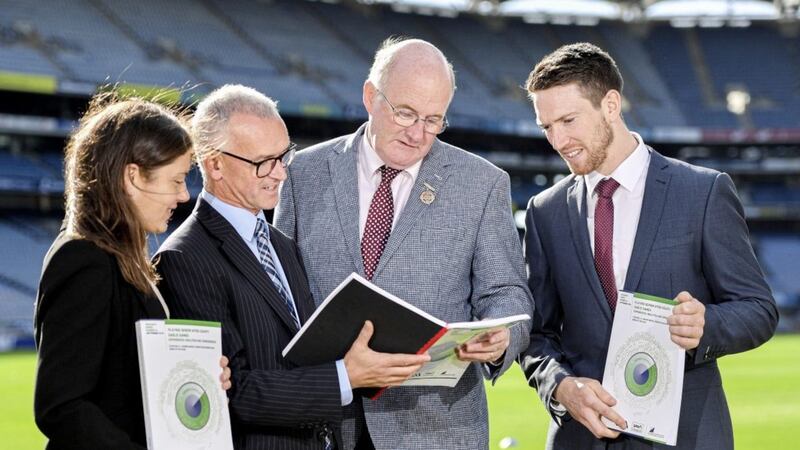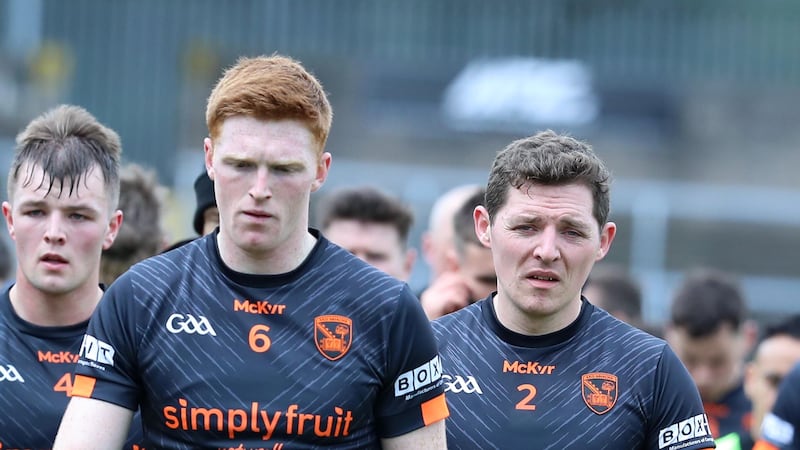“As for the first meeting of this [Fixtures Task Force], it should either be in Knock or Lourdes, because a miracle will be needed for the radical change that cannot be agreed to by people who are being paid to protect sectoral interest. I hope I'm completely wrong.”
Colm O’Rourke, June 2019
* * * * * * * * * * *
LAST Thursday morning, I received a text message from Paul Hughes.
For those that don’t know him, he’s a one-man juggernaut in St Patrick’s Maghera. Where Adrian McGuckin left off, Hughes took over.
The booming Derrytresk voice reverberates from the back pitch at the college, where he’s not only helped sculpt football teams going back decades, but has also coached several successful hurling teams, including an All-Ireland ‘B’ winning side.
The kids love him because he treats them like young adults. He talks to them like equals. Like thinking, conscious human beings rather than lowly subordinates.
He texted me on Thursday with an image of John McEntee’s column from that morning, and a reminder of a conversation we’d had five years ago on the topic that McEntee was tackling.
Namely, it was the idea that schools and universities have been cut a raw deal by a click of Central Council’s fingers.
In moving the U20 championship back from the summer to the early part of the year, the GAA had showed a complete lack of care for schools and colleges, who play their primary competitions at that time.
It was the same lack of thought they’d given to the clubs when they moved its U21 predecessor from its original March/April station into the summer last year, and introduced a league to go along with it.
It basically forced the club game into surrender. In Tyrone for example, where they’ve been avidly protective of the club game, they were left with no choice.
In order to prevent mutiny from the clubs by telling them they wouldn’t have access to their county players for more than the five starred games they’d signed up for, Tyrone simply left a big gap in the middle of the summer with no football.
The inter-county U20 league began in Ulster on May 29 last year, with the All-Ireland final played on August 3. That replaced the old championship that was played off over six or seven weeks in March and April.
The latest compromise is to move it back to the start of the year, but to stretch it out from January until the end of March. The semi-finals will be set for St Patrick’s Day, which will clash with the showpiece schools’ games.
While John McEntee rightly lamented the impact that, from an Ulster viewpoint, the U20 championship will now have on both MacRory and Sigerson Cup, it was a decision that’s merely part of the bigger picture.
There is, in effect, no room now for the MacRory Cup. There’s no room for the Sigerson Cup. There’s no room for club league football. There are adult club championships in dual counties being squashed into the space of a month. The Ulster U21 club competition is probably going to disappear. There are still minor championships being played in late November.
Player welfare is a preserve of the GPA.
But look, we know this.
The Fixtures Task Force effectively collapsed last week when the Club Players’ Association pulled out, calling the idea a “Trojan Horse” after it became clear to the CPA that it was a vehicle for the GAA to leave things as they are.
Colm O’Rourke was widely praised for his column on Sunday past, but it was back in June that he hit the nail on the head with the quote at the top of the page. Sadly, he wasn’t nearly as wrong as he hoped he’d be.
It feels necessary at this point to reveal something of a vested interest in the task force. Along with three possible independent chairmen put forward by the CPA in the formative stages, they also put forward “names of people who could be task force members.”
My name was on the list of candidates. For whatever little I might have offered, I was happy to sign up in the hope that it would be a truly independent body that would be given a blank canvas.
But just like Colm O’Rourke, just like the CPA leadership, I feared for it once I saw the make-up of the task force.
“In the end as you know, John Horan selected the committee and chairman and did not use any of our recommendations except a representative from the CPA, a representative from the GPA and a representative from Third Level,” said the CPA’s statement last week.
It would have been great to see the likes of Niall Moyna on it, someone from the sports science background that the CPA also asked for, but were shot down on.
Of the three options that will be put forward to Central Council now, two of them are radical. The fact that there are two radical proposals means that even if people do have a base level of support for significant change, their vote is likely to be split.
The third option is to start the championship later in May. This has been sold as giving more time to clubs, except that it doesn’t. Their window would still close at the end of April, and early May would be given to county teams for preparation.
And the likely net result of implementing that proposal is that the All-Ireland finals will go back into September, therefore extending the inter-county season once more.
So after pledging that it would be a process with the best intentions to solve the chaos for clubs, the most likely consequence is that it gets even worse.
It will get tougher for the players too, upon whom eternally greater demands continue to be placed. That’s despite the GAA and GPA having an independent report compiled by ESRI last year, in which it was found that players were concerned by the level of demands being placed upon them and called for solving the issue to be considered “from the viewpoint of safeguarding not just these players’ welfare, but the welfare of future generations of players as well.”
When asked earlier this year by The Irish News if the obvious outcome of the report was that the inter-county season had to be scaled back, Tom Ryan batted it away: “That’s one conclusion that you could come to from looking at it.”
The way this Fixtures Task Force has been handled presents the starkest evidence yet that the GAA has no interest in genuinely fixing the fixtures, because it can only be done by stripping back the inter-county game.
The task force was the best democratic option available, and it has failed.
If the clubs are to be properly listened to, it’s time for the CPA to consider an escalation.









